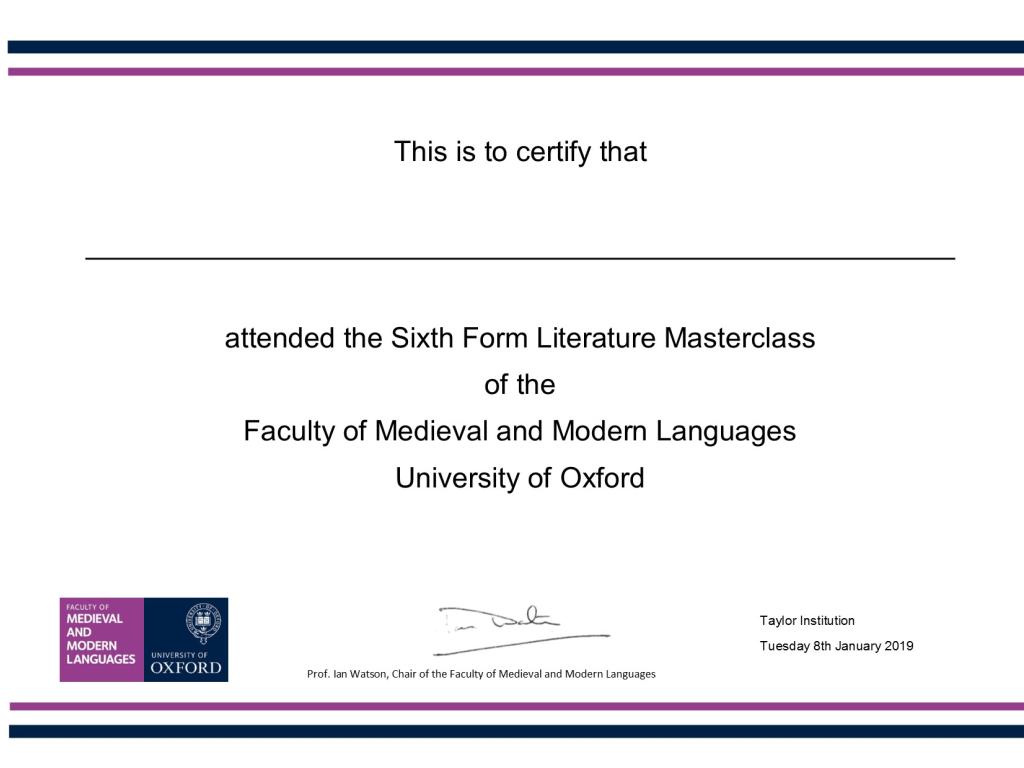
Most of our alumni will be aware that there has been a large increase in outreach work in recent years, with the University committing more resources to widening access for under-represented groups. Many of our efforts focus on working with regions and communities that have little history of sending students to Oxford: in recent months we have been on tour to Wales and the South West, and are looking forward to trips to North Yorkshire, Shropshire, and Newcastle over the spring vacation.
However, our support for languages also takes in schools a little closer to home. Readers will no doubt share in our disappointment that the number of students taking languages at GCSE and A Level has been in decline for several years, which naturally has a knock-on effect on university applications. Teachers from across the UK have cited reasons such as budget cuts, severe grading, and the push towards STEM subjects as reasons for this decline. These factors affect schools in Oxfordshire as well as those further afield. We feel a responsibility to foster linguistic diversity in our local community, and to support Modern Languages in our local schools. Read on to find out what we’ve been up to …
Sixth-Form Literary Masterclass
The Sixth-Form Literary Masterclass was launched in 2017 by Prof. Catriona Seth and Dr Simon Kemp, in the French sub-faculty. Inspired by a conversation with a local teacher, it aims to provide support for Year 12 and 13 students who may be encountering literature in a foreign language for the first time.
When literature was re-introduced to the A Level in 2016, some teachers reported anxiety about teaching it, some for the first time, in a demanding syllabus and with a potentially unpredictable assessment structure. The Masterclass was designed to introduce pupils to some key techniques of literary analysis, give them practical advice about close reading, and equip them with skills they could continue to develop in the classroom.
Pupils from all state schools in Oxfordshire are invited to the Taylor Institution. They attend a plenary lecture on literary analysis, covering topics like ‘Lexis and Imagery’, ‘Perspective’, ‘Time and Tense’, and ‘Theatricality’. Following a pause for biscuits (!), they break out into smaller groups to practise close reading or take part in a workshop, guided by an academic and often supported by a current undergraduate ambassador. The sessions are based on whichever text they are studying in school so the event is directly relevant to their academic studies.
We generally welcome around a dozen schools to the Masterclass. In 2019, we opened the event up to include German and Spanish pupils as well, following the model successfully developed in French over the preceding two years. One busy Tuesday in January, we filled the hall with keen Francophiles in the morning, and Germanists and Hispanists in the afternoon, with the lucky few who were dual linguists being treated to lunch at Trinity College in between.
The 6th form masterclass has been well received by our local schools and, for us, has been an invaluable opportunity to forge relationships with MFL teachers in our area, who act as a useful barometer in helping us to understand language trends UK-wide. Additionally, we have started to make some of the plenary talks available online, so that students beyond Oxfordshire can also benefit from this event.
Year 9 Day
Of course, successful outreach has to start much younger than Year 12. With that in mind, we are increasingly targeting students in Years 8 and 9, before they make their GCSE choices. One of our largest outreach events is our Year 9 Languages Day for local pupils. 2019 was the third year we have run this event, and we generally welcome in the region of one hundred students for an afternoon of talks and workshops at The Queen’s College.
The afternoon is designed to offer an array of language-based activity, some of which will draw on what pupils are learning in school, while some content will introduce them to new topics or languages. For us, it is one of the most enjoyable events of the calendar: we get to introduce new learners to linguistics and ab initio languages, and also help them to subtitle a ‘Ghost Train’ film in French, German, or Spanish. The day is a huge collaborative effort, involving academics and graduate students from across the Faculty. We have also been extremely lucky to have been supported by some fantastic undergraduates, who help run the workshops and offer the Year 9s a valuable insight into languages at university. Their perspective, as students who were in the Year 9s’ position only a few years previously, really helps to bring the subject alive for the younger learners.
While our work with local schools coalesces around the two big events in January, we also work hard to stay in touch with schools in our area throughout the year and you will be able to learn more about other schemes involving local pupils in a future issue of The Oxford Polyglot.